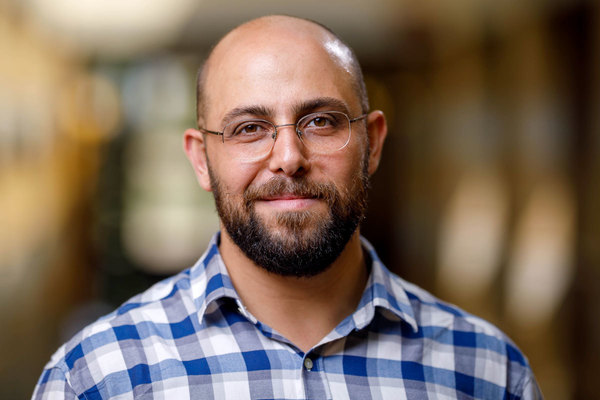
The more we think of the Muslim question as a host of questions the more we avoid the self-righteousness of the one answer, admittedly the more ubiquitous form of response. One advantage, however, to positing it as “the Muslim Question” is that it falls into a familiar register—familiar at least to political theorists. Political theorists are animated by concerns that do not necessarily feature at the heart of the more “disciplinary” study of Islam (as in “Islamic Studies”). The normative import of these concerns has a bearing on our life together as political animals, so to speak, that the inquiry of, say, the historian of Islam lacks. I will be looking at the responses of two scholars of Islam before I turn, in the second half of this essay, to a political theorist and engage Anne Norton’s book, On the Muslim Question, more directly. I conclude by reflecting on the continued salience of the role of class analysis in addressing the issues raised in Norton’s book.
In making The Case for Islamo-Christian Civilization (2004), Richard Bulliet reacts to “an overwhelming urge,” as he puts it, “to do something useful” in the wake of 9/11 (vii). An examination of the historical record, he tells us, should establish the “sibling character” (16) of Islam and Christianity: “The historical development of Western Christendom and Islam parallel each other so closely,” he argues, “that the two faith communities can best be thought of as two versions of a common socioreligious system, just as Orthodox Christianity and Western Christendom are considered two versions of the same socioreligious system” (15).
Bulliet (in J. H. Hexter’s classification of historians) is a splitter, not a lumper (241–42). He works with particulars and presents us with facts. And facts belie the “long and willful determination to deny the kinship” that he postulates (Bulliet, vii). Setting the record straight should undermine this denial, Bulliet believes. But it seems to me that what motivates the more pervasive “clash” literature is something much stronger than a shortage of facts. There is, for one, the “narcissism of minor differences,” in Freud’s parlance. Here we may stipulate, against Bulliet, that the smaller the differences, the more aggressive the processes of difference making that are intended to reinforce identities. The desire for distinction is one of these processes. But there is more.
At any rate, the answer cannot be sought in reality only, as Bulliet tries to do, but in the imaginaries that govern the self-images and the narratives of origin of the respective civilizations—I use the term (civilization) loosely and my distinction between reality and imaginary is only analytical. Even if Bulliet’s arguments are true—which I think they are—they cannot have much effect as arguments; they must be made to speak to the imaginaries of his audience. “At the end of reasons comes persuasion,” says Wittgenstein (81, §612).
To the extent that an historian may entertain making a case of the sort we are dealing with, a historian of mentalities is perhaps better positioned to move past presenting reasons to the more involving task of persuasion. A historian of mentalities is usually a lumper, not a splitter. She is more concerned with structures of thinking or—which is better—feeling. Her aim is to distill totalities, systems of meaning, collective representations, life-worlds, or life-forms—choose your pick. And she studies these totalities over long stretches of time. Hers is the history of the longue durée. Since the history of mentalities involves a more gestalt take on whole situations, she aspires to effect a shift in perspective that casts facts in a new light and makes the weaker argument the stronger—or the stronger argument the weaker. (It would depend on the perspective, really.) When the western imaginary happened to be puritanical, Muslims were cast as lascivious and dissolute, when the western imaginary loosened up a bit, Muslims became sexually suppressed.
Meaning and Ambiguity
It is as an historian of mentalities that Thomas Bauer presents himself in his book, recently translated into English as A Culture of Ambiguity. Bauer weighs the virtues of the two cultures or civilizations in question by investigating the extent to which they tolerate ambiguity, with tolerance of ambiguity being a decisive psychological trait that shapes every aspect of individual and collective being. From this perspective the “sibling character” of Islam and the west proves more an oxymoron than a truism. In Islam (post-formative, pre-modern, Sunni Islam), Bauer finds, “there exists a principle—namely, the domestication of ambiguity coupled with the greatest possible theoretical openness—that guides all Islamic disciplines” (95). Not only is there “an equanimous acceptance of complexity and ambiguity,” but “an exuberant pleasure in them” (xi).
When the western imaginary happened to be puritanical, Muslims were cast as lascivious and dissolute, when the western imaginary loosened up a bit, Muslims became sexually suppressed.
Bauer detects a process very similar to what Bulliet has elsewhere called—in a rare lumper mood—“Big Bang, Big Crunch.” Whenever a “surplus of ambiguity” leads to a “crisis,” a process of disambiguation sets in. Crucially, however, it “will not be followed through to its end, because a total elimination of ambiguity would be perceived as a loss” (32). “In all these cases,” adds Bauer, “the compromise solutions have not resulted in the original positions being forgotten. Each solution merely constitutes the center of orientation around which a broad spectrum of positions continues to be constructed, which do not deny each other’s right to exist” (21).
Western thinking, on the other hand, would not settle for anything less than thorough disambiguation. It is a compulsion that drives a culture marked by what Zygmunt Bauman diagnoses as a “horror of ambiguity.” A crisis leads to a reaction, each time more aggressive than its predecessor, and each time craving more order and more clarity. It leads to an entrapment in a hall of mirrors, in a thicket of ambivalences and uncertainties that defeat the original intention (of attaining to clarity) and culminate in disaster. Indeed, according to Bauer, the contemporary woes of the Muslim World only began when Muslims wanted or were coerced to live up to this western ideal.
Nowhere is the difference between Islam and the west clearer than in the attitude towards the stranger. Whereas for Muslims “foreignness and otherness” never disturbed what Bauer calls their “serene look at the world,” for the West they become the locus of extreme anxiety, a threat “more horrifying than that which one can fear from the enemy” (240). Here, Bauer is following Bauman. For Bauman the Jews were the paradigmatic stranger: they “belonged everywhere and nowhere.” It is “the will to annihilate all ambiguity [that] has ultimately resulted in the Holocaust” (quoting Bauman, 241).
Two things prevent Bauer from concluding that a similar fate awaits the more urgent stranger of western societies, the Muslim. The first is the Holocaust itself. Such an atrocity of colossal dimensions can be allowed to happen once but, surely, no more—one assumes that the lesson has been learned. The second is democracy. Aside from music and the visual arts, democracy “constitutes the greatest Western achievement in the matter of ambiguity” even if its way “is lined by hecatombs of victims” (278).
Searching for Emulsifiers
This is a conclusion that Norton, I suppose, would not contest. It would hardly be “the Muslim Question” if it was not prefigured by the Jewish Question and the Holocaust looms large in these two-questions-become-one. The gravity of the issue does not preclude un petit jeu de mots. On the pages of Norton’s book, the Muselmänner of the concentration camps—made famous by Primo Levi’s memoir, If This is a Man—become, for all their powerlessness, the powerful bearers of a resounding moral message: “If Western civilization is to enfold, embrace, and comprehend the Jews and in so doing claim its own Judaism, that should be done without giving license to another series of pogroms. If the West is to bear true witness to the evil of the Holocaust, then it must meet ethical demands that go beyond the construction of memorials and an ethic of remembrance. The West must close the camps and take the Muselmänner as its own” (175).
On the question of democracy, I believe Norton would also agree with Bauer’s characterization of the cost of arriving at it—we are now becoming more mindful of the cost of upholding it, having taken it for granted for some time. When Bauer says: “no other culture was so easily put into question by the otherness of the other” (255), I imagine Norton nodding in approval. These are homebred anxieties, as she demonstrates, and this is where she wants to tackle them: at home. But it is in addressing the question of democracy that her subtlety as a political theorist shines through.
Norton and Bauer may disagree on a range of issues. The main point of disagreement, however, remains the extent to which they take Islam and the west, or any two cultures for that matter, to be permeable. The main problem in Bauer’s book is one that is usually detected in historians of mentalities, or in thinkers who appeal to paradigms or epistemes in offering structural explanations: these constructs become inert entities, even prisons, immune to change from within or without. For Bauer, as in the “clash” literature that he wishes to undermine, Islam and the west are like oil and water. They do not mix. Norton, on the other hand, thinks that emulsifiers are easily procured and the mixing of oil and water might have some real staying power. Norton has a nose for emulsifiers and she rejoices in the endless possibilities or recipes that bring together oil and water.

The many dissenting voices, intolerant of Islam, she interrogates with sympathy and fairness. Nevertheless, her tu quoques are sharp when she wants to cut through nonsense and blunt when she needs to shake up an obstinate interlocutor. “European journalists,” she objects, “preened themselves on their courage in attacking a minority population with little political power, subject to discrimination and continuing slights” (35). They “exchange the hazardous practice of speaking truth to power for the less risky business of mocking minorities” (40). Like Bulliet, her facts are ready and her figures give the lie to mythmakers: western reactions to the Danish Cartoons affair are out of proportion with the facts (24ff.).
More importantly, Norton detects in the dissent of the dissenters the ills that plague Western democracy. Her response is to salvage the political. “The streets of Amsterdam do not speak, as they once did, for freedom of religion or freedom of speech. They speak for the freedom to consume” (159). “[F]reedom follows not from sexual pleasure,” which is more a compulsion than freedom as she portrays it, “but from political power and the possibility of individual autonomy” (53). “Charity is not a relation between equals” (113) and for this reason signifies the absence of the political. And, finally, she insists that poverty is not an ethical as much as a political problem—the political problem?
Norton criticizes the western fixation on sex as an identity as opposed to sex as an act, a mere act—a fixation compounded by a demand to confess and an urge for transparency. I take this to be a (somewhat disguised) attack on identity politics. I hate to say as a Muslim I think so on so—I think it short-circuits honest discussion. But just for now, I will say that as a Muslim, I can see how identity politics provides a shelter for Muslims like myself and I admire the impulse that gives rise to it. But identity politics, especially when it becomes a selling point for corporations, is not making democracy more resilient. The solidarities it produces are dispersed. They cannot for better or for worse stand in the face of the more traditional solidarities of class, or religion, or nationality.
Solidarity is the key word here. Norton sees Ibn Khaldun as founding politics on friendship, as opposed to those—Jacques Derrida, Carl Schmitt, and others—who want to erect it on enmity (128ff.). She admires the effort but recognizes that the sphere of politics is agonal and that democracy is about accepting defeat. But the ʿaṣabiyyah that Ibn Khaldun analyzes and elevates into “the political fact par excellence,” as Lenn Goodman puts it, is not simply friendship (210). It is a more raw kind of solidarity. Even solidarity is just one of its dimensions. Power and prestige are two other dimensions. The solidarity of the frontiers, of the countryside, can be quite potent and is always potentially venomous, as Kathrine Cramer’s work on the Wisconsin electorate shows. Cramer portrays a constituency full of spite against an urban elite that is not willing to consider its grievances, which are true grievances. The so-called White middle class worker in the United States has seen his income reduced and his securities diminished and he misdirects his anger against the so-called left. (Notice that the masculine pronoun is part of the narrative and, therefore, I retain it.) Both are misguided. Meanwhile corporate America grows more tyrannical. When the economy dwindles, and it will, Muslims and other minorities will pay the price of that anger.
Norton has a nose for emulsifiers and she rejoices in the endless possibilities or recipes that bring together oil and water.
Finally, my disagreement with Bauer on the way he somehow reifies Western and Islamic mentalities should not make us underestimate their reality. Building on the work of Ibn Khaldun, Peter Turchin distills the centuries long processes of identity formation in the crucible of “meta-ethnic frontiers.” Since comparison illustrates best, he studies the cases of Russia and the United States in tandem. The Russian “asabiya” was forged against the Muslim Tatars who were subdued by a combination of religious zeal (Eastern Orthodox Christianity in this case) and a strong centralized government that orchestrated the frontier war efforts. American asabiya, on the other hand, was forged at the frontier against an opponent that was seen, above everything else, as racially different. The weight of the campaigns westwards was borne by organically emerging free associations (in Tocqueville’s words) that brought together formerly antagonistic European nationals. The melting pot united them in one race to the exclusion of non-Europeans. Americans might take pride in their religious tolerance and their democratic tradition, but that is not the same as taking credit for them. Nor does it make them immune to all types of bigotry.
Solidarity and Class in the US
The salience of race as a category in the United States is not, therefore, something that can be eradicated by legislation or pontification. In the presence of economic or military hardship (whether perceived or real) the affective defense mechanisms that are recruited will find in race a galvanizing force that makes possible any concerted effort, without which no threat can be countered. Such mechanisms will rely on religious faith and a “strong leader” in the case of Russia. Russia and the United States are not monolithic, to be sure. But the dominant imaginary is the one that was battle-hardened and has had the benefit of time. It cannot be dispelled overnight nor can it be weakened by being challenged by “softer” solidarities.

In the “west,” liberalism is the force that can claim to have done the most for underprivileged groups. It is, moreover, deeply rooted in the Western imaginary. If we are to counter the rawer solidarities of nation, religion, or race, the liberal tradition is something we want to count on. Curiously, however, liberalism casts itself as an anti-solidarity school (ideology would be a better word, but it would also go against liberalism’s self-image as a neutral school of thought.) When liberalism awakens to the virtues of solidarity it takes the shape of cosmopolitanism or identity politics. While they are not mutually exclusive, the one is too diluted and the other too narrow. The other powerful contender is class awareness. In classical republican thought, class camaraderie represented a resource for solidarity upon which a healthy civic spirit could thrive. But especially in the United States, given its other historical frontier with communist Russia, class is not solidary enough to counter race.
For these reasons, as much as I would love to (naturally) share Norton’s more optimistic conclusion, I hesitate to do so. Against the many beautiful success stories of living together, of making a new America that is more Muslim, as a previous America has become more Jewish (4, 178), I keep thinking of Larry Gopnik (Michael Stulbarg) in the Coen Brother’s homecoming movie, so to speak, A Serious Man (2009): being Jewish and being American, supposedly reconciled, can still create life-wrecking tensions. The examples that Norton offers, inspiring as they are, cannot hold at bay the primeval forces that are summoned by the “ideals” of race or nation in the west. More powerful gods are being worshiped in the opposite camp and these are gods whose wrath might not be propitiated by anything less than a holocaust.
This said, I cannot think of an alternative to Norton’s fighting narrative with narrative. Solidarity is an impulse that is sustained by a good story. And a story is good to the extent that it speaks to the imaginaries of its listeners. The alchemy that produces new imaginaries is difficult to comprehend. But we already have the melting pot. Perhaps all we need is a good emulsifier.

